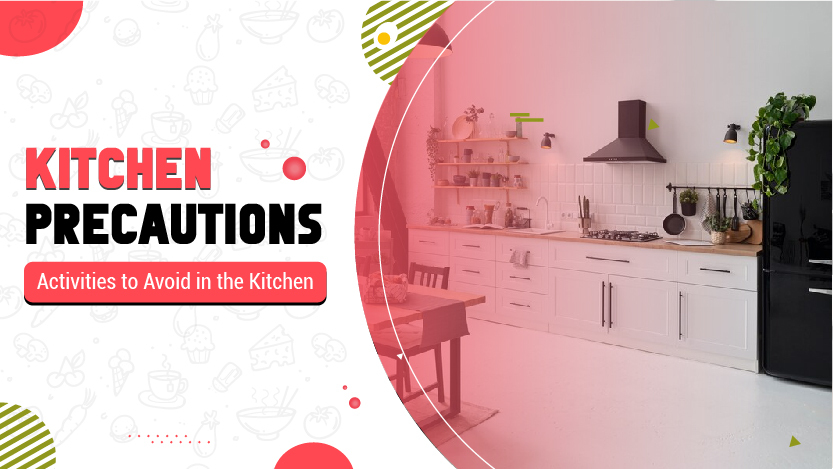The heart of every home is the kitchen, where the family eats together, shares their daily activities, and makes fantastic memories. However, it is also a susceptible place where accidents occur; the hot oven top, sharp knives, and electrical appliances require careful handling to avoid any nightmare.
For a safe and healthy environment in the kitchen, careful precautions should be taken to ensure a safe cooking atmosphere. Let’s discuss a few kitchen precautions that can save you from kitchen accidents and become a safe place for the family to hang out.
1. Avoid Using Damaged or Faulty Appliances
Damaged or faulty electronic kitchen appliances should not be used at any cost. If you observe wear and tear in an appliance or faulty wires, you must either replace or get that machine repaired. Using such devices can cause a short circuit and eventually cause a fire. In addition to this, don’t load a single electrical outlet with multiple appliances; this may cause overheating and pose the risk of fire. This not only applies to the kitchen but the entire house. Look after your electrical sockets, switch them off when unused, and avoid overloading them with multiple wires.
2. Do Not Leave Cooking Unattended
The leading cause of fires is unattended cooking. Whether you are baking or cooking something on the stove, don’t leave it unattended. Keeping an eye on your cooking saves you from fire, and if you have toddlers at home, it also saves you from little children touching or getting harmed. In case of baking and cooking, always set a timer.
Like every field, advances in technology have made life easier. The introduction of nutri pots has made cooking a lot easier. They help you with a timer, and you can easily cook anything you want the way you want it. Despite all these advancements, never leave the kitchen unattended when something is being cooked.
3. Avoid Wearing Loose Clothing
Loose clothing or mixed nylon fabrics can easily catch fire. Clothes that are flowing and loose or have cuts can get entangled and easily catch fire. The ideal way to get into the kitchen is by tying your hair back tight so that it doesn’t fall off in any eatables and doesn’t get entangled in anything. Long untied hair has the chance of becoming entangled in kitchen equipment.
4. Keep Flammable Objects Away from Heat Sources
All flammable objects, such as paper towels, wooden utensils, and dish towels, should be kept at a distance from heat sources. All flammable objects should be kept away from the stove and heating appliances. Ideally, the kitchen should have a fire extinguisher to put away the fire in case of emergency
5. Do Not Use Metal Utensils on Non-Stick Cookware
Cooking with metal or non-stick utensils can damage the surface, leaching harmful chemicals into the food. Use cookware such as stainless steel, ceramic, or cast iron to prepare your food so that your meals are safe to consume and you and your family are safe. Handle your utensils with extra care so they have a prolonged life and the cooking layer is not damaged.
6. Avoid Cross-Contamination
Cross-contamination is the leading cause of any food-borne disease. Such diseases are life-threatening. To prevent cross-contamination, follow these guidelines:
- The cutting boards for raw meat, poultry, and vegetables should be separate.
- Raw food should be handled with a lot of care. They may contain bacteria or germs .wash your hands thoroughly before and after dealing with raw food. Moreover, do not defrost any meat and freeze it again; this will spread germs in the meat. Secondly, whenever you wash raw meat, make sure that while cleaning, the water doesn’t splash on other kitchen crockery; this spreads germs.
- Ensure that the countertops, utensils, and cutting boards are washed and sanitized regularly.
7. Do Not Ignore Spills and Clutter
A clean kitchen is not only a peaceful place but also a safe place to cook; spills and clutter often lead to falls and other accidents in the kitchen. Keeping the countertops free of clutter and spills gives you a free space to work efficiently. Moreover, cluttering the kitchen and keeping it untidy invites rodents into the kitchen.
8. Avoid Overcrowding the Stove
The stove you use for cooking should be free, and whenever you use it, use the appropriate pot size according to the furnace. Overcrowding the stove with multiple pots and pans can lead to uneven cooking and increase the risk of spills and accidents. Plan your cooking schedule and use the appropriate cookware for each burner to prevent this. If you must cook multiple dishes simultaneously, consider using other kitchen appliances, such as a slow cooker or microwave, to distribute the workload.
9. Do Not Leave Sharp Objects Unattended
Handle sharp objects such as a grater and knives with great care and precision. They should always be supervised on countertops or in sinks. Sharp objects like knives and scissors should always be supervised on countertops or sinks. Take the proper precautionary measures for harp objects to save your family from accidents. However, it is ideal to learn how to use knives.
10. Avoid Using Water to Extinguish Grease Fires
Most people are unaware of this, but grease fires should be handled differently than other fires. Using water to extinguish them can spread the fire, worsening the situation. Grease fires happen mostly when the oil is ignited or becomes too hot and catches fire. However, the heat source should be turned off, and the flames should be covered with a lid to settle the fire. Baking soda and special extinguishers should be used to put out these fires.
11. Do Not Allow Children and Pets Unsupervised Access
Never leave your children and pets unsupervised in the kitchen. They are innocent and unpredictable. Clear boundaries should be established. Safety gates should be used for toddlers and pets during cooking times. Regular maintenance of kitchen appliances and equipment is essential for safety and efficiency—schedule routine inspections and cleanings for your oven, stove, refrigerator, and other appliances. Replace worn-out parts and address any issues promptly to prevent malfunctions and hazards.
12. Never Use Fork As a Tool
Whenever food gets stuck in any electrical appliance, such as a toaster, never use a fork to remove it. You might get electrocuted. Instead, switch it off, remove the plug, let it cool, flip it upside down to remove the food item, or use wooden chopsticks.
Conclusion
To ensure that your kitchen is a safe and happy space for you and your family, it is essential to be aware, cautious, and adhere to the best kitchen practices. Taking the above kitchen precautions can create a safe environment for your family to make memories together. Cooking should be enjoyable and not a burden; make your kitchen a happy, relaxing space. By being a little vigilant, you can avoid accidents, too.





37 Comments